Epistemology in Classical India
Epistemology in Classical India
The Knowledge Sources of the Nyya School
Stephen Phillips

First published 2012
by Routledge
711 Third Avenue, New York, NY 10017
Simultaneously published in the UK
by Routledge
2 Park Square, Milton Park, Abingdon, Oxon OX14 4RN
Routledge is an imprint of the Taylor & Francis Group, an informa business
2012 Stephen Phillips
The right of Stephen Phillips to be identified as author of this work has been asserted by him in accordance with sections 77 and 78 of the Copyright, Designs and Patents Act 1988.
Typeset in Sabon by IBT Global.
Printed and bound in the United States of America on acid-free paper by
IBT Global.
All rights reserved. No part of this book may be reprinted or reproduced or utilised in any form or by any electronic, mechanical, or other means, now known or hereafter invented, including photocopying and recording, or in any information storage or retrieval system, without permission in writing from the publishers.
Trademark Notice: Product or corporate names may be trademarks or registered trademarks, and are used only for identification and explanation without intent to infringe.
Library of Congress Cataloging-in-Publication Data
Phillips, Stephen H., 1950
Epistemology in classical India : the knowledge sources of the Nyaya
school / Stephen Phillips.
p. cm.
Includes bibliographical references (p. ) and index.
1. Knowledge, Theory of (Hinduism) 2. Nyaya. I. Title.
B132.K6P49 2011
121.0954dc23
2011023967
ISBN13: 978-0-415-89554-5 (hbk)
ISBN13: 978-0-203-15238-6 (ebk)
For Colin and Prashant
Contents
Acknowledgments
This book began in the epistemological reconstructions of a previous generation of Nyya philosopher/scholar, Bimal Matilal, Jiten Mohanty, Karl Potter, and Sibajian Bhattacharyya in particular, along with the radically empiricist and tracking the truth approaches to epistemology of my teachers Roderick Firth and Robert Nozick. More fundamentally, I owe my understanding of Nyya to my teacher and colleague, N. S. Ramanuja Tatacharya, a traditionally trained Sanskrit-speaking scholar/philosopher whose mastery of the pram a-stra is matched only by his graciousness and generosity. We worked on Nyya over a period of years (with six different trips by me to India) at the Institut Franais de Pondichry in Pondicherry in South India and later in Bangalore.
a-stra is matched only by his graciousness and generosity. We worked on Nyya over a period of years (with six different trips by me to India) at the Institut Franais de Pondichry in Pondicherry in South India and later in Bangalore.
Let me also acknowledge Arindam Chakrabarti, with whom I discussed Nyya epistemology at length in connection with papers the two of us read at a special session of the American Philosophical Association, Eastern Division, New York, December 2000, Justification, Mental Causation, and Defeaters: An Introduction to Indian Philosophy for Analytic Philosophers. My paper, What Analytic Philosophers Can Learn from Indian Reliabilism, and Chakrabarti's, Knowledge from Trusted Tellings and Its Preventers, were critiqued by Philip Quinn, Matthew Steup, and Steven Luper.
More immediate predecessors to the chapters here are four papers I presented in 2009 and one in 2011: to the Philosophy Department of Baylor University, The Nyya Theory of Knowledge Sources: Perception, Inference, and Testimony as Factive, Prolific, and Trusted, The Epistemological Question: Nyya on the Purpose of Pram a-stra, at the conference Self, Knowledge, and Reality in Indian Traditions, University of California, Berkeley, Nyya's pram
a-stra, at the conference Self, Knowledge, and Reality in Indian Traditions, University of California, Berkeley, Nyya's pram a (Knowledge-Generators) as Natural Kinds, at the conference, Thinking Inside the Box: The Idea of a Category in Indian Philosophy, Center for Hindu Studies, Oxford University, Cannibalizing Nyya Epistemology, at the International Conference for Indian Philosophy: World Views, Barcelona (read in my unfortunate absence by Parimal Patil), and, most recently, Nyya's Internalist Theory of Justification Applied to Its mukti-vda at the University of New Mexico, at Life, Death, and Liberation: A Conference of Comparative Philosophy. Of all the comments and criticisms I received at these places, those by Kisor Chakrabarti and Jonardon Ganeri in particular I know have influenced my exposition. And John Taber in particular helped me avoid some mistakes. Also informing this book is an earlier paper, Internalism as well as Externalism in Nyya Epistemology, which I read at the invitation of the Philosophy Department, Jadavpur University, Kolkata, January 2008, with excellent feedback from Sukharanjan Saha.
a (Knowledge-Generators) as Natural Kinds, at the conference, Thinking Inside the Box: The Idea of a Category in Indian Philosophy, Center for Hindu Studies, Oxford University, Cannibalizing Nyya Epistemology, at the International Conference for Indian Philosophy: World Views, Barcelona (read in my unfortunate absence by Parimal Patil), and, most recently, Nyya's Internalist Theory of Justification Applied to Its mukti-vda at the University of New Mexico, at Life, Death, and Liberation: A Conference of Comparative Philosophy. Of all the comments and criticisms I received at these places, those by Kisor Chakrabarti and Jonardon Ganeri in particular I know have influenced my exposition. And John Taber in particular helped me avoid some mistakes. Also informing this book is an earlier paper, Internalism as well as Externalism in Nyya Epistemology, which I read at the invitation of the Philosophy Department, Jadavpur University, Kolkata, January 2008, with excellent feedback from Sukharanjan Saha.
A portion of chapter four is taken from my contribution to Piotr Balcerowitz, ed., Logic and Belief in Indian Philosophy, Warsaw Indological Studies, Volume 3 (Delhi: Motilal Banarsidass, 2011), From Ga gea's Tattva-cintma
gea's Tattva-cintma i, the kevala-vyatireki-prakara
i, the kevala-vyatireki-prakara am, Negative-Only Inference. I wish to thank Piotr for his editing. The entry in the on-line Stanford Encyclopedia of Philosophy, Epistemology in Classical Indian Philosophy http://plato. stanford.edu/entries/epistemology-india although appearing on the Web earlier than this book's date of publication is in many places derivative.
am, Negative-Only Inference. I wish to thank Piotr for his editing. The entry in the on-line Stanford Encyclopedia of Philosophy, Epistemology in Classical Indian Philosophy http://plato. stanford.edu/entries/epistemology-india although appearing on the Web earlier than this book's date of publication is in many places derivative.
At the University of Texas at Austin, I must thank first of all the Philosophy Department, whose teaching arrangements made possible my long stays in India and most immediately whose grant recommendation, approved and funded by the College of Liberal Arts, for the Fall semester 2010, enabled me to compose these pages. Among current and past graduate students, the book has benefited from discussions with Joel Feldman, Alex Catlin, Neil Dalal, Ellen Stansell, Matthew Dasti, Malcolm Keating, and Paul J. Williams. Williams read a late draft suggesting several improvements. Matthew Dasti deserves special acknowledgment and his dissertation which skillfully links Nyya epistemology with Vedntic theism. I and all these students (five now professors elsewhere) have utilized resources of the indological community as well as that of philosophy at the University of Texas at Austin, and I feel fortunate to live in an academic environment with both dimensions.
At Routledge, I wish to thank Andrew Beck, Michael Andrews, Erica Wetter, Felisa Salvago-Keyes, Michael Watters (Integrated Book Technology Global), and Sherri Linsenbach, a most admirable copy-editor.
Austin, Texas
May 2011
1 Historical and Conceptual Introduction
This book is written for philosophers and students of philosophy, not for specialists in classical Indian thought. An historical stage is set in this first chapter for a philosophic spectacle to follow. And even here the main aim is not historical but to introduce key concepts of the theory of knowledge that will be engaged throughout, that of the Nyya school. Nyya's epistemological concepts were pretty much shared across school or system, but my intention in this book is not to present a common classical Indian epistemology but rather only the Nyya version. Competing Buddhist and other theories will be surveyed, but mainly from the Nyya perspective. I try to avoid using Sanskrit words, but those I do use are defined in an appended glossary, the first part of which gives dates of texts and authors as well as the names of the major schools together with their most important positions.

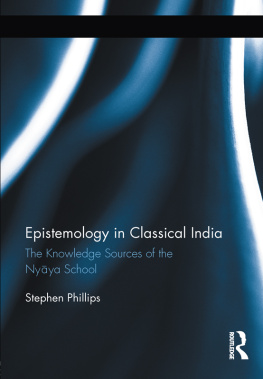

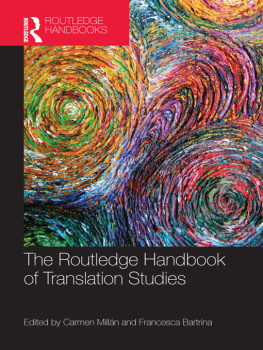
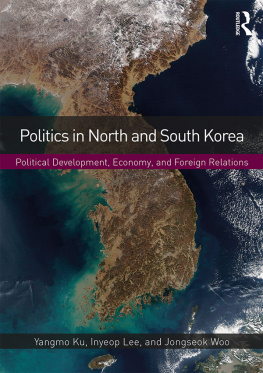
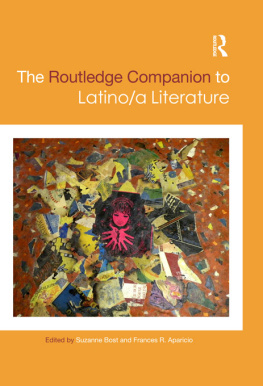
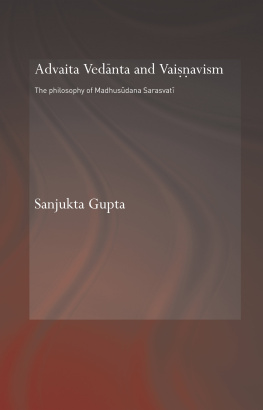
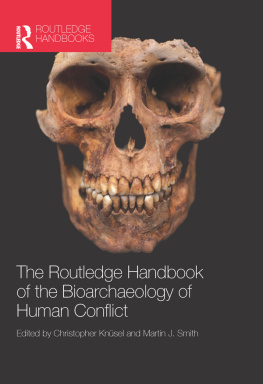

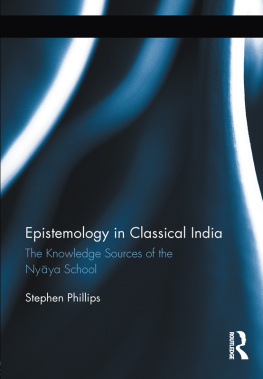

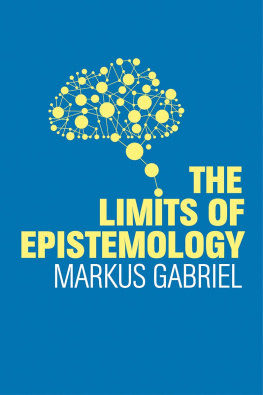
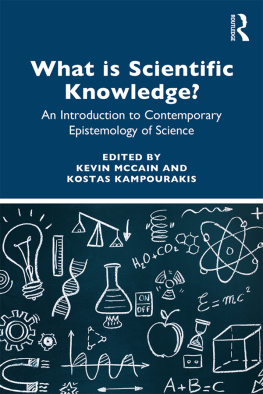
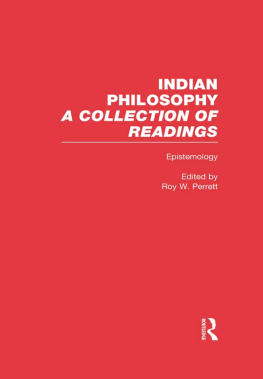
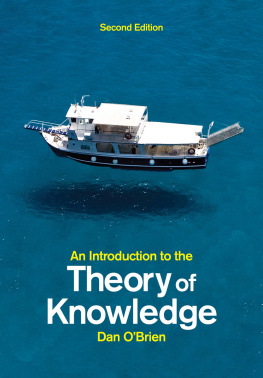

 a-stra is matched only by his graciousness and generosity. We worked on Nyya over a period of years (with six different trips by me to India) at the Institut Franais de Pondichry in Pondicherry in South India and later in Bangalore.
a-stra is matched only by his graciousness and generosity. We worked on Nyya over a period of years (with six different trips by me to India) at the Institut Franais de Pondichry in Pondicherry in South India and later in Bangalore. gea's Tattva-cintma
gea's Tattva-cintma